10 Reasons Why Dogs Are Afraid of Flies + 5 Tips
Do you ever wonder: why are dogs afraid of flies? It’s a question that countless pet parents ask.
Flies seem like such small, insignificant creatures, but for some reason, they terrify our furry friends. Well, there are actually several reasons for this.
Dogs are usually fearless and brave when faced with everyday situations, but this fiendish creature can make even the bravest of canines quiver.
Sometimes our Chihuahua, Leo, is afraid of flies but other times he tries to bite them.
In this blog post, we will explore the 10 reasons behind this fear and offer some tips on how to help your dog overcome it.

Why Are Dogs Afraid of Flies?
Flies are a true nuisance for us humans, but they may cause a great deal of terror in dogs due to their quick movements and buzzing. If your pup was bitten or swarmed before, it is possible that he sees flies as potential threats.
Poor eyesight, anxiety, or a lack of exposure are all factors influencing why your dog might have an irrational fear of these pesky creatures.
10 Reasons Why Dogs Are Afraid of Flies
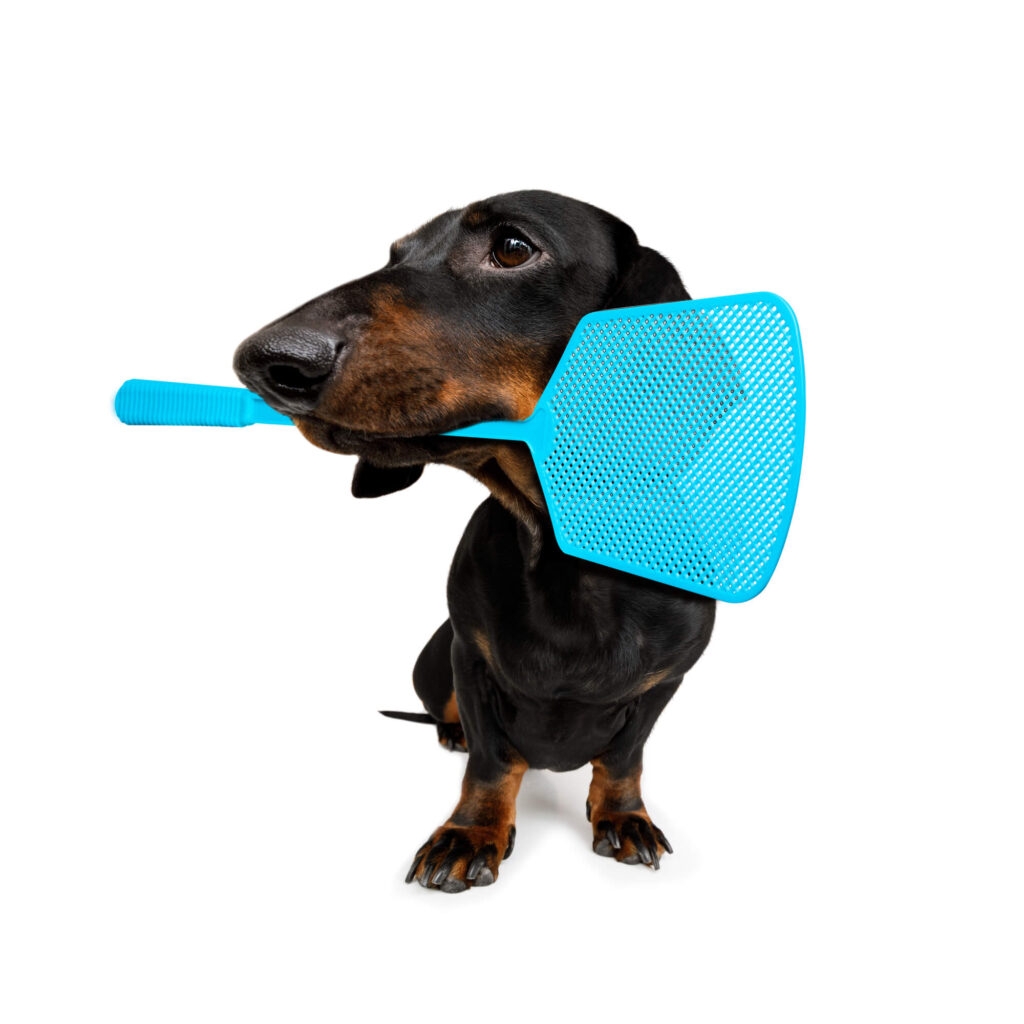
1. Quick and Erratic Movements
Flies have the ability to move around quickly, making them difficult for dogs to keep track of.
Their sudden and unpredictable movements can scare dogs and trigger their instinctive fear responses.
If your dog is afraid of flies, she may bark, run away, or hide whenever she senses a fly.
2. Sensitive Ears
The sound of flies may be barely perceptible to us, but our four-legged friends clearly pick up on the irritating noise with their remarkable sense of hearing.
Humans can hear up to 20,000 Hertz while dogs are capable of detecting up to 65,000 Hertz.
If you are wondering “why is my dog afraid of flies,” one common reason is that their hearing is a lot more sensitive than ours, so they are more aware of their sound.
This unfamiliar noise can cause fear as they are unsure of what is making the sound.
Dogs may also startle if they come across larger flies, such as horseflies or house flies, which can have a louder buzzing sound.
3. Been Bit Before
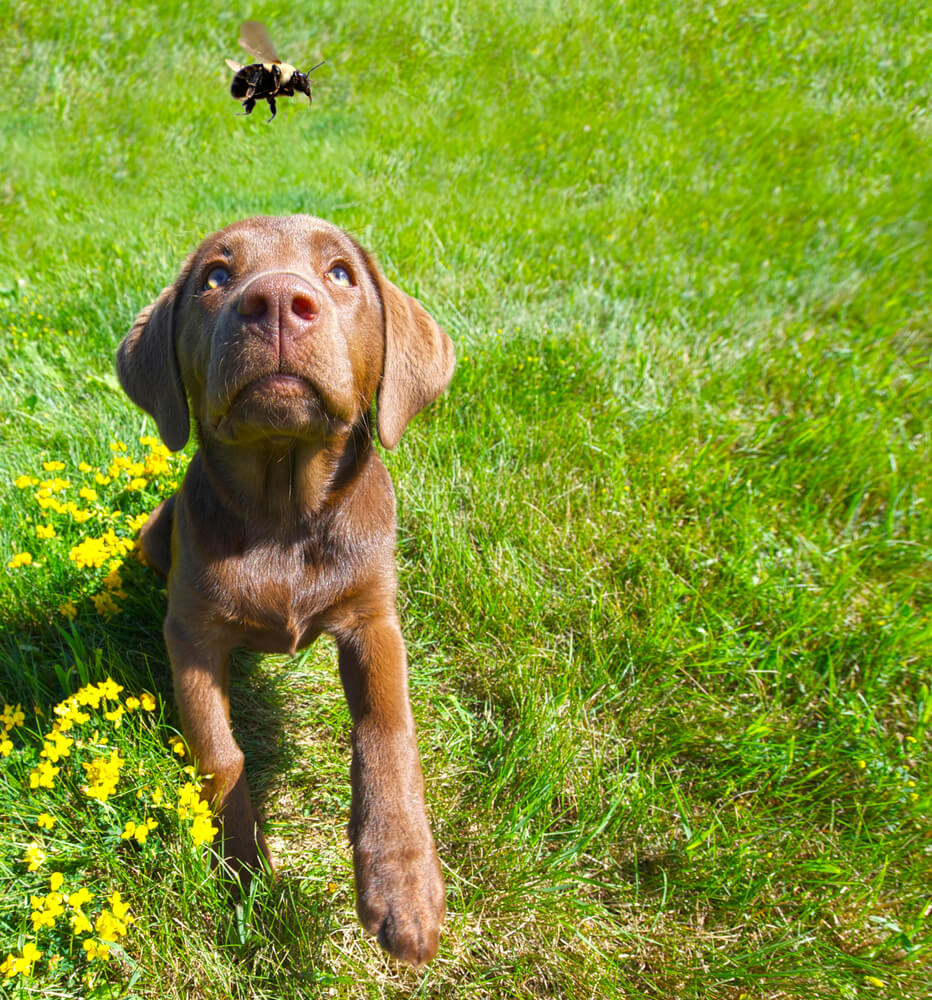
If your furry friend has been bitten or stung by a flying insect before like a wasp or black fly, it would have caused them considerable pain and discomfort.
This traumatic experience could cause them to associate flying bugs with potential pain and danger, making them fearful of all flies.
So if your dog had a run-in with a flying insect, the memory can elicit a fear response even though most flies are harmless.
4. Lack of Exposure
Another reason why dogs are afraid of flies could be due to a lack of exposure.
Dogs that haven’t had much interaction with flies may become scared when they come into contact with one.
If your puppy wasn’t socialized enough as a pup, they may become overly afraid or anxious about new objects and creatures.
Since these dogs have yet to learn that flies are harmless, they may become scared of them due to unfamiliarity.
5. Negative Experience
Dogs may be afraid of flies if they have had a negative experience with them in the past.
If your dog has been chased or swarmed by flies, they may become scared of them and try to avoid them in the future.
If your rescue dog previously lived in a home or shelter infested with flies, they may feel anxious each time they encounter a fly.
This lingering distress is likely due to the negative memories associated with their past living situation.
6. Genetics
Some dogs are more predisposed to fearfulness due to their genetics.
Certain breeds, such as Chihuahuas, can be genetically prone to fearfulness, which can cause them to be more scared of things than other breeds.
Encountering something brand new, like say a broom, flies buzzing around, balloons, or loud sounds such as fireworks can all be unnerving for dogs and will induce fear.
If a mother dog is exposed to fear, stress, or inadequate nutrition while pregnant, her puppies are more prone to anxious behaviors.
7. Anxiety
Dogs may be scared of flies if they suffer from general anxiety.
If your dog is prone to feeling anxious or stressed, the sudden presence of a fly may trigger this fear response.
Anxious dogs will be more prone to perceiving potential threats and may become overwhelmed with fear when they come into contact with certain objects or creatures.
Signs of an anxious dog include excessive licking, trembling, panting, whining, burying their head into you, or wrapping their paw around you when anxious.
8. Aging
As dogs age, their senses become weaker.
An older dog may be scared of flies because their vision or hearing is not as sharp as it used to be.
An aging dog’s ability to track and evade flies may diminish so they won’t be able to escape them as quickly as they used to.
This can lead to fear or anxiety in older dogs.
9. Lack of Control
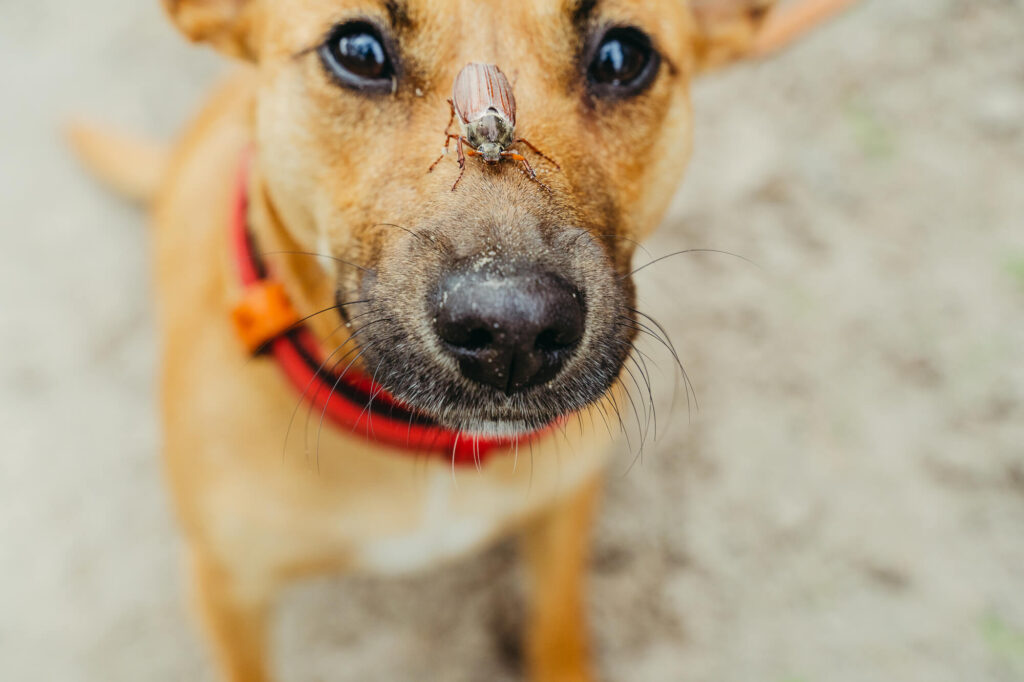
Dogs may become scared of flies because they feel like they lack control over the situation.
Flies zip around in an unpredictable way, making them a difficult target to catch or get away from.
This sensation of lack of control can be unsettling for pups; it’s like there’s no way out!
Even attempting to capture or retreat from the flies may prove fruitless due to their rapid maneuvers.
10. Flies are Scary
Finally, some dogs are afraid of flies simply because they are scary.
It’s common for dogs to run and hide the second they see or hear a fly.
To a dog, the sensation of a fly landing on them or buzzing around their ears can be quite unnerving – it’s simply too intrusive for many dogs!
Not to mention that flies have the tendency to swarm and this could easily overwhelm even the most confident pooch.
How to Tell If Your Dog Is Scared of Flies?
If your dog is scared of flies, they may attempt to escape, tremble, or hide when a fly enters the room.
Other signs of fear include panting, whining, and barking excessively.
If your dog is displaying any of these behaviors, it may be a sign that they are scared of flies.
Additionally, if you observe your dog avoiding or trying to avoid certain areas of the house where flies are present, this could also indicate that they’re scared.
5 Tips to Stop Your Dog From Being Scared of Flies
To help your pup become less fearful of flies, here are some different methods you can use to help them.
1. Use Positive Reinforcement
The best way to help a dog overcome its fear of flies is by introducing positive reinforcement training.
If your pup shows signs of fear when they encounter a fly, reward them with treats and praise when they remain calm.
This will help your dog associate the presence of flies with positive experiences, making it easier for them to stay calm and learn to not be scared of them.
2. Desensitization
Another way to help your dog get over its fear of flies is by desensitizing them to the presence of flies.
To do this, start by introducing your pup to a fly in a controlled environment, such as indoors.
Provide treats and praise when they remain calm in the presence of the fly, gradually increasing the amount of time spent near flies.
Eventually, your pup should become desensitized to the presence of flies and will no longer be scared of them.
3. Create a Fly-Free Space
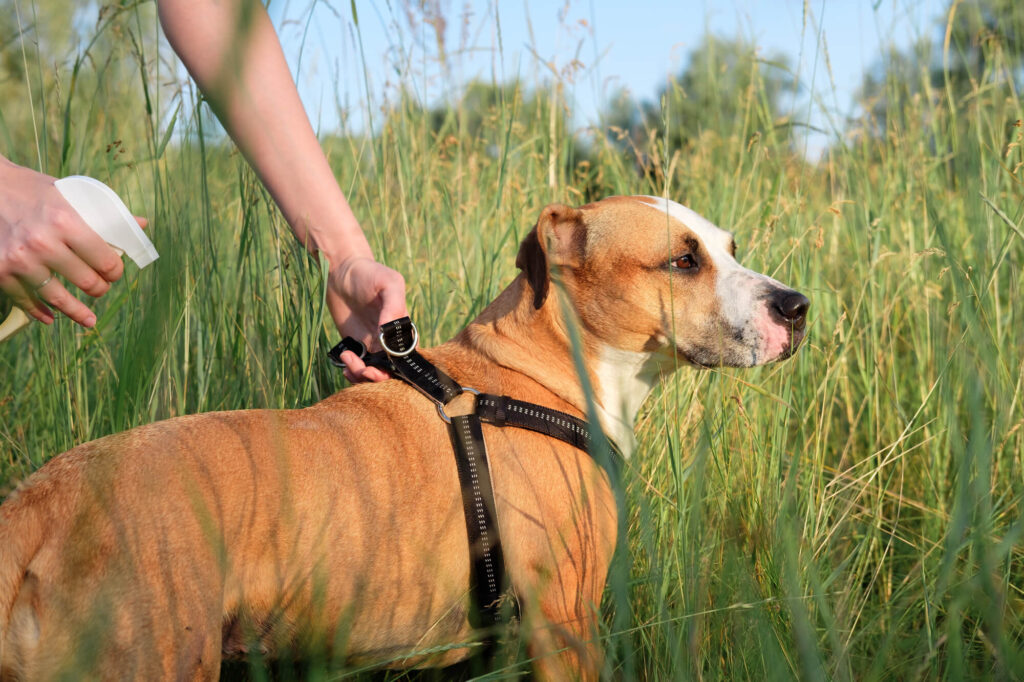
If all else fails and your dog is still terrified of flies, create a fly-free space in your home where they can feel comfortable and safe.
To reduce the likelihood of flies buzzing around in the first place, there are several steps you can take.
Make sure screens are attached to all open windows or doors, keep eating areas clean, and regularly empty any trashcans.
Avoid leaving dirty food bowls or bones out too long, as this can attract flies.
4. Use Insect Repellant
Looking for some simple, homemade fly repellants?
Apply Vaseline to your dog’s coat and ears.
Another option is to make a diluted apple cider and water mixture (1:1 ratio) to spray on your dog (avoiding the face).
5. Teach Your Dog to Catch Flies
So, here’s a quirky trick – teach your dog to catch flies!
It might seem a bit goofy, but for some dogs who are afraid of those buzzing critters, it can be surprisingly effective.
Next time a fly zooms in, turn it into a playful hunting game.
Your furry friend is likely to join in on the action, and when they do, give them a treat for being brave.
Summary
So there you have your answer to why are dogs afraid of flies.
By knowing all the potential reasons driving this behavior, you can better understand how to help your pup cope with their fear.
From providing positive reinforcement and desensitization to creating a fly-free space, with the right strategies in place, your pup can learn to not be scared of flies and start enjoying their outdoor adventures again.
FAQ
Why Are Chihuahuas and Small Dogs Scared of Flies?
As Chihuahua owners ourselves, we know our little guy tends to be afraid of many things, and flies are no exception. Smaller dogs tend to be scared of flies because they may perceive them as larger and more menacing than they actually are.
Since Chihuahuas typically have pricked ears, they can often pick up on the sound of a fly buzzing before you may be able to see it, adding to their fear. Small dogs may have had a negative encounter with flies in the past, which could cause them to act skittish and wary around flying insects.
A lot of dogs are prone to phobias and strange behaviors like being afraid of brooms, headbutting, and licking inside your nose so being scared of flies is not something to be too worried about.
Should I Let My Dog Chase Flies?
Whether or not you let your pup chase after buzzing flies is entirely up to you. Many dogs enjoy the pursuit, and it’s a great way for them to burn off some excess energy!
Fruit flies and household flies aren’t likely to cause your pup any harm, but if you’re concerned about your pet ingesting potentially harmful bugs such as horse or deer flies, it’s best to keep your pup away from them.
Why Is My Dog Afraid of the Bug Zapper?
The sound and light of a bug zapper can startle even the bravest pups. The loud buzzing noise and the bright flash of light that comes from a bug zapper can be very disorienting to dogs, which can cause them to become fearful or anxious.
Dogs possess very sensitive hearing and the bug zapper emits a high-pitched noise that can be uncomfortable for pets. If your dog is afraid of the bug zapper, try keeping it away from areas where they like to hang out.
Why Is My Dog Afraid of Fly Swatters?
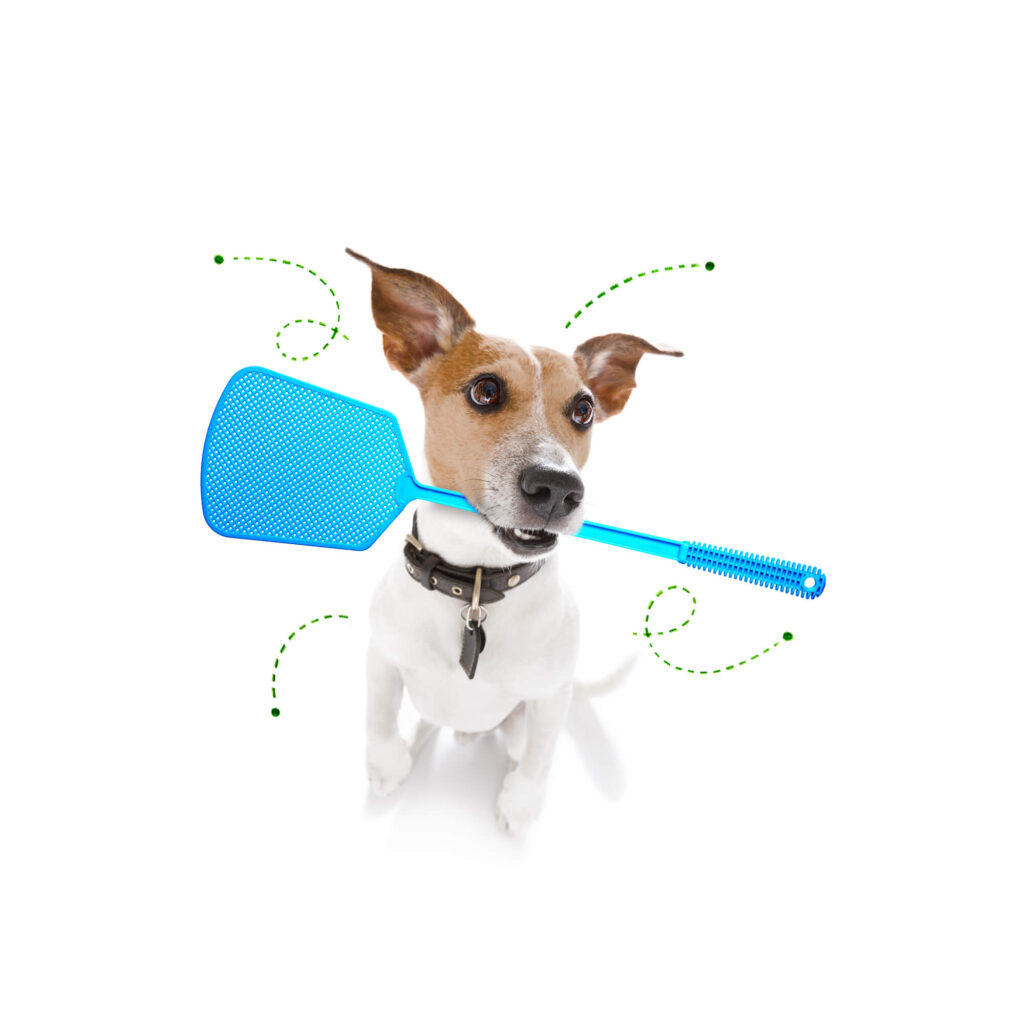
The swish of a fly swatter and the loud sound it makes when it smacks against something can be terrifying for some dogs. The sound can startle even the calmest and most collected pups. If you’re using a fly swatter near your pup, it can make them feel fear and distress.
Why Do Flies Bother My Dog?
Flies are attracted to dirty or matted coats, fecal matter, and open wounds. Flies feed off of feces, blood, saliva, tears, and mucous. They also like to lay their eggs in feces, as well as on dirty fur or open wounds. These factors can all contribute to making a dog an attractive target for flies.
Why Do Flies Land on Dog’s Ears?
Dogs have thin fur on their ears, making them easily accessible to flies. Additionally, the oils, wax, and dirt present in a dog’s ears also act as an attractive beacon for flies.
Dogs with large droopy ears like hound breeds and Spaniels are most vulnerable to flies landing on their ears because their floppy nature makes it easier for flies to settle down without any resistance from the animal itself.
Can Flies Hurt My Dog?
Yes, if a fly bites your dog it can cause discomfort, irritation, skin infections, and in severe cases, an allergic reaction.
Flies can lay eggs on the surface of a dog’s skin which can cause skin irritations and lead to itching and scratching. They can also transmit bacteria, viruses, and parasites.
If your dog eats flies, most likely nothing will come of it due to their acidic digestive tract which kills most bacteria. However, it’s important to keep an eye out for any signs of illness after consuming a bug.
Can Flies Hurt Dog Ears?
Yes, flies can hurt dog ears when they bite the ears and feed on the blood. Your pup’s thin ears are susceptible to fly bites, which can cause inflamed and painful sores.
Dogs that have drooping ears are prone to developing “fly strike dermatitis” on the outer edge of their ear due to these persistent pests. Inspect and clean your dog’s ears on a regular basis.
Read next: How to Clean Chihuahua Ears
Why is My Dog Snapping at Flies That Aren’t There?
Canines snapping at imaginary flies is potentially the result of a gastrointestinal disease, a partial seizure, a neurological disorder, or discomfort after eating. If your pup is exhibiting this behavior, it’s best to take them to the vet for a check-up.
How Do I Keep Flies Off My Dog Naturally?
To discourage flies from landing on your pet, ensure you keep their coat well-groomed and free of dirt and fecal matter. Flies are attracted to matted fur and feces, so regular brushing and bathing can help reduce the number of flies buzzing around your pup.
A DIY option is to combine water and apple cider vinegar at a 1:1 ratio in a spray bottle and spray your pup when they are outdoors (avoiding the face). Flies dislike the smell of apple cider vinegar and will stay away from your pup.
Petroleum jelly is another option to provide an extra layer of protection against flies. Rub a small amount on the ears and other areas where your pet is vulnerable to fly bites.
Finally, make sure to keep areas near your pup well-maintained and free of food or anything that may attract flies. Remove any food bowls or bones from the ground as soon as your dog is done with them. As temperatures climb, so too does fly activity so keeping your dog indoors will also help to minimize their exposure.
What Happens If a Fly Bites a Dog?
If a fly bites a dog, it may cause some irritation, redness, and discomfort for the dog.
Depending on the species of fly, the type of bite could range from simply an annoying pinch that irritates the skin to a more serious bite that can cause inflammation or infection. See a vet if your dog shows any signs of infection or if the bite seems particularly painful.
Do Flies Lay Eggs on Dogs?
Yes, flies lay eggs on dogs. Flies typically lay eggs in fur with fecal matter, on their skin, or in open wounds.
When the fly eggs hatch, the larva (maggots) will feed on the dog’s skin and organic matter for several days before emerging as an adult fly. Maggots can cause irritation and damage to the dog’s skin if left unchecked.
Do All Dogs Hate Flies?
Some dogs hate flies while others aren’t bothered by them. Generally, bigger dogs tend to be less bothered by flies than smaller breeds because they are not as easily overwhelmed by the buzzing and constant movement of the insects.
However, all dogs can be affected by flies when they become persistent and might twitch their ears or run away when they sense the presence of a fly.
Does Dog Pee Atract Flies?
Dog urine is a major draw for flies. This is because of the potent smell of ammonia and also due to the warm temperature of fresh urine. As soon as your pup does their business, you can be sure those pesky little flies will come buzzing!
To prevent pesky flies from hanging around your pup’s potty spot, rinse the area with a hose afterward or sprinkle some peppermint or lavender essential oil to help deter flies from coming back. Additionally, planting basil and lavender plants close by can help fend off future fly traffic!
Can I Spray Vinegar on My Dog for Flies?
Yes, apple cider vinegar is a natural insect repellent and its strong smell can be off-putting for flies. You should always dilute the apple cider vinegar with water at a 1:1 ratio before spraying it on your pet.
Avoid spraying the solution directly on your dog’s face, ears, or eyes as it may cause irritation. Instead, you can lightly spray it on the fur around their neck, back, and legs and rub it in.
Does Vaseline Keep Flies Off Dogs?
Using Vaseline to keep flies off of dogs is an effective yet gentle solution. Apply a thin layer of petroleum jelly to your dog’s ears, belly, and any other area that is particularly vulnerable to fly bites.
This creates an extra barrier of protection from the insects and will also make them less likely to land on your pup. Not only will Vaseline deter flies, but its moisturizing properties can also help soothe skin irritations caused by bug bites.
Related Posts:
- 12 Surprising Reasons Why Dogs Are Scared of Brooms
- Why Are Dogs Afraid of Balloons? (+ Helpful Tips)
- Why Do Dogs Headbutt? (12 reasons + solutions)
- 28 Foolproof Ways to Stop Dogs From Tipping Over Their Water Bowl
- Why Does My Dog Bury His Head Into Me?
- 13 Strange Reasons Why Dogs Lick Each Other’s Eyes






